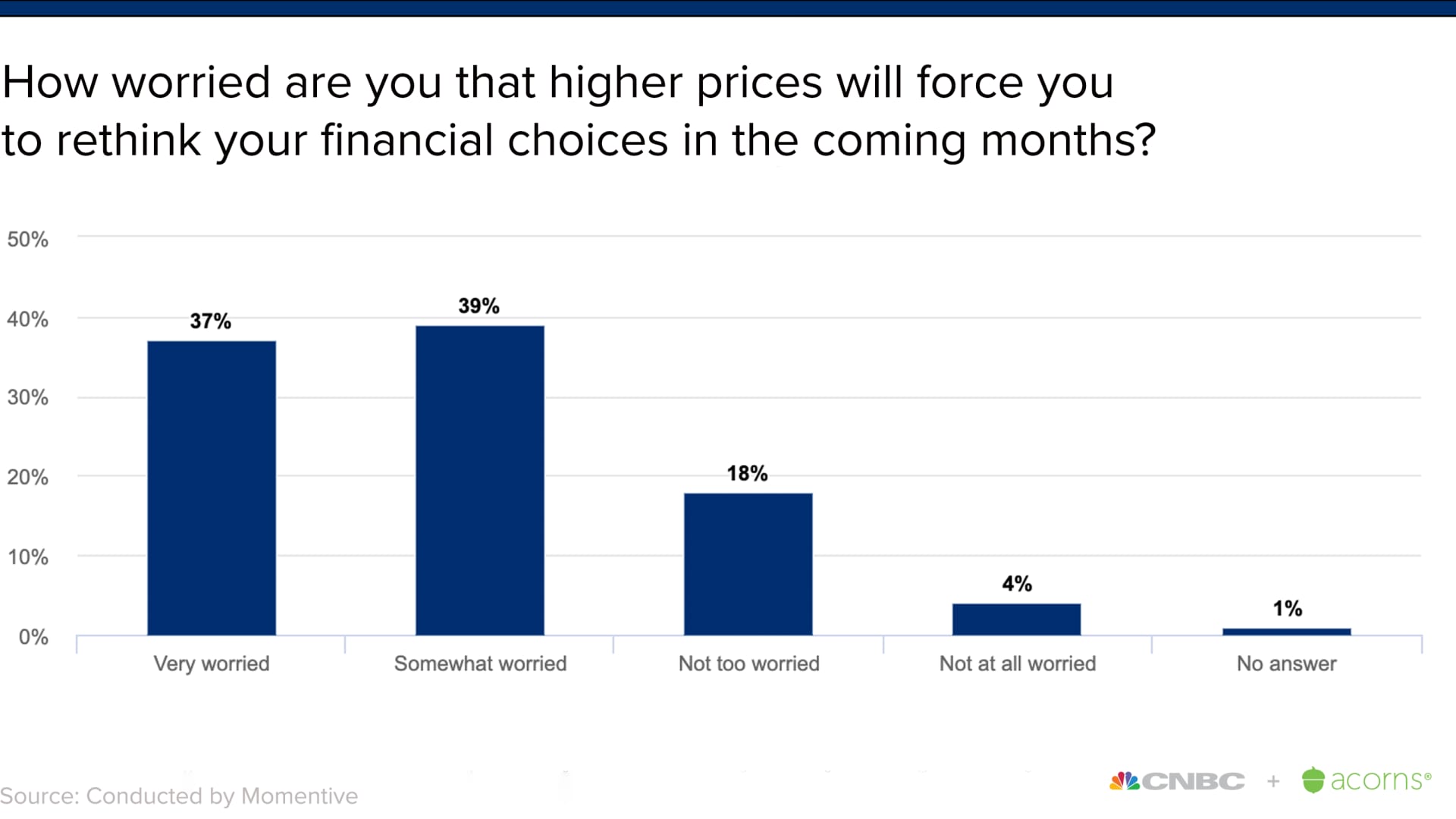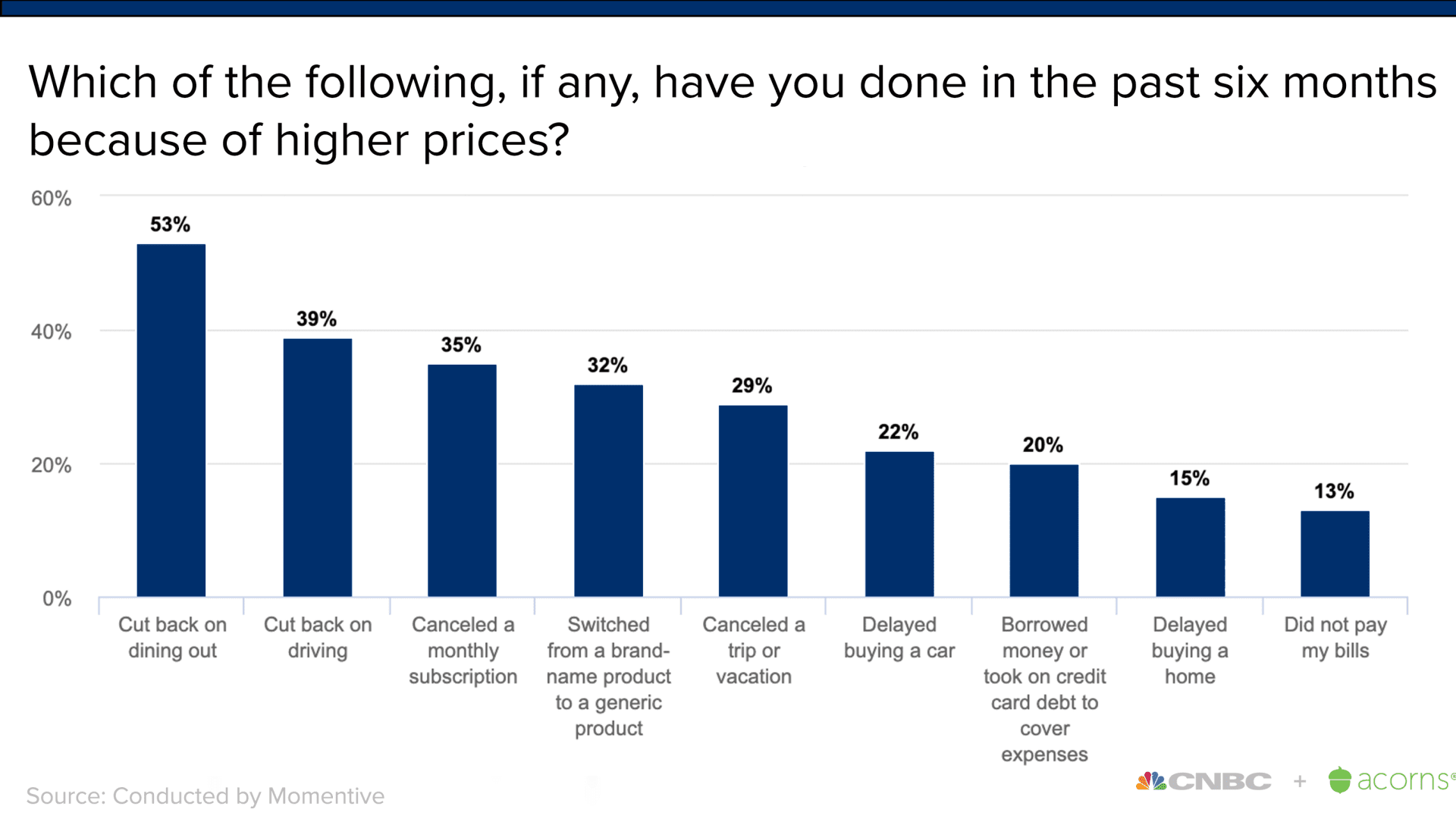
Surging inflation has Americans reconsidering how they spend their money.
The Consumer Price Index, which measures a wide-ranging basket of goods and services, jumped 7.9% in February from 12 months prior. Prices are going up on everything from the food you put on the table to the gas that powers your car.
That's weighing heavily on people's minds, with 48% thinking about rising prices all the time, according to a CNBC + Acorns Invest in You survey, conducted by Momentive. The online poll was conducted March 23-24 among a national sample of 3,953 adults.
Get San Diego local news, weather forecasts, sports and lifestyle stories to your inbox. Sign up for NBC San Diego newsletters.
Three-quarters are worried that higher prices will force them to rethink their financial choices in the coming months, the survey found.

Inflation is costing the average U.S. household an additional $296 per month, according to a Moody's Analytics analysis. Experts expect it to get worse before it gets better.
Money Report
Still, there hasn't been a significant impact on consumer spending, although retail sales grew at a slower pace than expected in February.
The biggest area people have cut back on is dining out, with 53% saying they've done so, according to the survey. They are also driving less and canceling monthly subscriptions, among other things.

If higher prices persist, dining out, driving and trips or vacations are the top three areas Americans plan to cut back on even more.
To be sure, the past year has been difficult for many. Fully 52% said they are under more financial stress than a year ago. They are most concerned about gas prices, housing costs and food costs. In the last year, gas spiked 38%, shelter rose 4.7% and food prices increased 7.9%.
Meanwhile, a bulk of Americans are unhappy with the response from the White House, with 61% disapproving of the way President Joe Biden is handling inflation.
Recession fears
The current environment has a majority of Americans concerned about an economic recession, with 81% of respondents believing one is likely to happen this year.
"People are definitely on edge," said Moody's Analytics' chief economist Mark Zandi. "Recession risks are high."
He puts the odds at 1 in 3 and rising.
When will inflation slow?
Inflation was brought on by the pandemic, which scrambled supply chains and labor markets, and worsened by the Russian invasion of Ukraine, which impacted gas and food prices, Zandi explained.
"If that diagnosis is correct, as the pandemic fades and as we get the other side of the fallout of the Russian invasion, inflation should moderate," he said.

However, consumers will be in for some more pain in the near term, as inflation continues, Zandi said.
"We've got a couple of bad months dead ahead," he said.
He predicts inflation will peak around May and by this time next year, it will be a lot lower, depending on how global events play out, as well as the response by the Federal Reserve. The central bank increased interest rates last month to combat inflation and plans another six hikes this year.
If the Fed doesn't calibrate things just right, the economy can go into a recession, Zandi warned.
Navigating higher prices

The first thing you should do is get a handle on your financial situation.
Asking yourself some key questions can help you figure out where you may be able to trim expenses, said certified financial planner Ashton Lawrence, a partner at Goldfinch Wealth Management in Greenville, South Carolina.
"What's the cash flow look like? What type of debt, how much debt are we looking at?" he said.
"It's about making the small changes and controlling where you can control."
More from Invest in You:
Most Americans are worried about a recession hitting this year
Here's what consumers plan to cut back on if prices continue to surge
Here's how retirees can navigate higher prices
Once you see where you are spending money, break it down into needs and wants, and begin to cut back on things that are optional, said CFP Carolyn McClanahan, founder and director of financial planning at Life Planning Partners in Jacksonville, Florida.
In fact, eating out all the time not only costs more money than cooking at home, it's also not as healthy, said McClanahan, who is also a medical doctor. When at the grocery store, use coupons and comparison shopping to help you save money.
There will be nights when time is tight and you are tempted to order takeout for dinner. McClanahan cooks in bulk on Sundays and puts meals in the freezer for those nights.
Carpooling or planning car trips to minimize driving can help with gas, as can working from home a few days a week, if feasible.
While it is natural to be concerned about rising prices, you can't control them — and worrying about it isn't good for your health, McClanahan said.
"Only think about the things that you can control," she said.
"Making certain you are spending your money in a thoughtful fashion is the one thing you can do to help mitigate the outside world around you."
SIGN UP: Money 101 is an 8-week learning course to financial freedom, delivered weekly to your inbox. For the Spanish version Dinero 101, click here.
Disclosure: NBCUniversal and Comcast Ventures are investors in Acorns.






